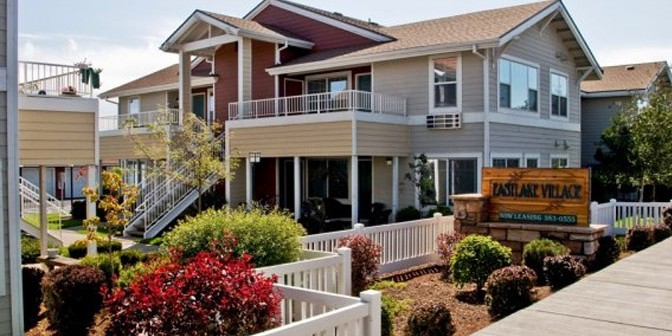(Photo above: East Lake Affordable Living | courtesy Epic Property Management)
On July 20, the City Council approved a number of actions that result in increased affordable housing supply in Bend. The City of Bend is the only city in Oregon that allocates this level of local revenue to affordable housing projects.
“All together these actions represent about $5 million worth of local contribution to affordable housing,” said Jim Long, Bend’s affordable housing manager.
The Council on Wednesday:
Approved $1.59 million in Affordable Housing Fund awards.
Sold City surplus property to Housing Works to build 25 units of affordable housing that will include a commercial component.
Sold City surplus property at Fifth and Dekalb to Central Oregon Veterans Outreach (COVO) to build eight units of affordable housing.
Approved $400,000 in System Development Charge (SDC) exemptions to help build 88 units.
Declared two additional properties as surplus. Those properties will be released through a request for proposal (RFP) process later this year.
The decisions made on Wednesday night, which will help to construct up to 160 new units of affordable housing, are just the most recent of many actions taken by the Bend City Council to address a broadly accepted problem.
The City has two different funding programs that that aim to address the needs of low and moderate income people in Bend.
1) Affordable Housing Fund
Bend is the only City in Oregon that is allocating local funds to affordable housing projects through an affordable housing fee, which is a fee on building permits.
2) Community Development Block Grant (CDBG) federal funding
Affordable Housing Fund loans are often the first funding that comes into any affordable housing project. Developers use them to leverage other, additional necessary financing to build the housing units. This is typically a long process; some units that are being built now were seeded with affordable housing funds the City issued years ago.
A Consolidated Plan, developed in 2014 with considerable community input, has defined priorities for using both of those funds.
The Consolidated Plan prioritizes increasing the amount and availability of affordable rental units. Other goals in the plan include increasing homeless shelter units, providing services to the homeless population, removing architectural barriers in public infrastructure and affordable housing development, providing support to necessary public services and employment training and economic development.
The City is required to have an affordable housing public advisory committee to help decide where the CDBG grant money goes. The City also directs the Affordable Housing Fund to the same programs. (More about the City’s affordable housing programs can be found at www.bendoregon.gov/affordablehousing.)
In addition to allocating funds to build housing units, over the last 24 months the City Council has adopted recommendations from the City’s Affordable Housing Advisory Committee regarding additional tools to reduce identified barriers. These include:
Expedited review and permitting for affordable housing projects. (Based on the City’s Affordable Housing Advisory Committee recommendations which also advised the City to make it easier to build accessory dwelling units and to provide a density bonus.)
Low income rental housing property tax exemptions.
SDC exemptions for affordable housing projects.
Identifying and using surplus properties for affordable housing.
“The City understands that the affordable housing situation is worsening. It’s a Council goal to continue to explore affordable housing strategies,” said Long.





